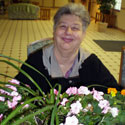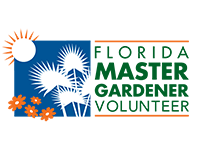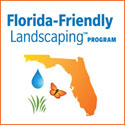The Neighborhood Gardener:
Horticultural Therapy & Master Gardener volunteers
By Lesley Fleming, HTR
The field of horticultural therapy intersects the world of Master Gardener volunteers often. Many community initiatives that Master Gardener volunteers are involved in subscribe to the concept that plants and gardening activities improve lives. This is the basis of the horticultural therapy profession, which delivers therapy through hands-on horticultural activities. Understanding the profession’s principles and techniques allows volunteers and professionals to deliver quality horticultural programs which maximize positive health outcomes for special populations including children, seniors, inmates, veterans, and physically and mentally challenged individuals.
The history of using horticulture as a treatment dates back to 1798, when Dr. Benjamin Rush worked with mentally ill patients. Following WWII, garden club members provided organized horticultural activities as part of veterans’ rehabilitation. The concept of using nature to improve human health and well-being gained credibility through research in the 1970’s and 80’s. Rachel and Stephen Kaplan found that certain types of landscapes made people feel more comfortable in certain environments. Roger Ulrich’s research demonstrated that patients with a view of trees had shorter hospital stays and less medication. There now exist well-researched and practiced methods of using horticulture to achieve therapeutic goals that improve well-being. Therapeutic gardens, adaptive gardening techniques, and horticultural therapy are recognized worldwide as effective in improving a range of health outcomes—physical, social, psychological, and cognitive.
The American Horticultural Therapy Association (AHTA) promotes the use of plants and gardening activities for therapeutic purposes. The professional association undertakes research, trains and certifies its members, sets therapeutic standards, and promotes various programs of horticultural therapy. Many of these are delivered by its members, who rely on volunteers to assist. Many horticultural therapists are Master Gardener volunteers; many Master Gardener volunteers work closely with horticultural therapists to deliver community services at schools, prisons, senior centers, hospitals, and botanical gardens. The core value of using plants and gardening activities for human well-being bring organizations together. The relationship between horticultural therapists and Master Gardener volunteers can continue to build on empirical research, respect for each other’s role, and the sincere motivation to help others.
For More Information
- American Horticultural Therapy Association
- EDIS Publication "Horticultural Therapy"
- EDIS Publication "Sensory Gardens"
About the Author
Lesley Fleming (MA, HTR) is a registered horticultural therapist practicing in the Tampa area. She has received several awards for her work in horticultural therapy including the AHTA Alice Burlingame Humanitarian Award and the FAHTA Professional Service award. Lesley was the President of the Florida Chapter of the American Horticultural Therapy Association and has written many articles on topics within the profession. She has been a Florida Master Gardener for ten years.





